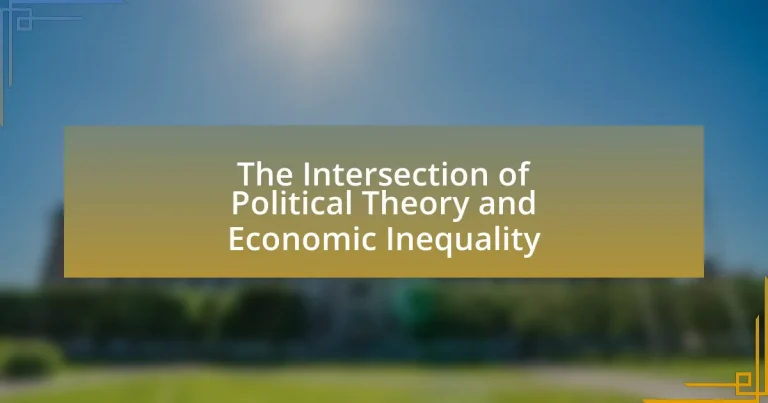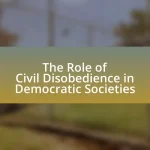The article explores the intersection of political theory and economic inequality, analyzing how various political ideologies shape the distribution of wealth and resources in society. It examines key political theories, including Marxism, Liberalism, and Social Democracy, and their differing perspectives on the causes and implications of economic disparities. The discussion highlights the importance of understanding this intersection for developing effective policies aimed at reducing inequality and promoting social justice, as well as the historical contexts that have influenced these theories. Additionally, it addresses contemporary movements and potential solutions proposed by political theorists to tackle economic inequality, emphasizing the challenges and practical steps individuals can take to engage with these issues.
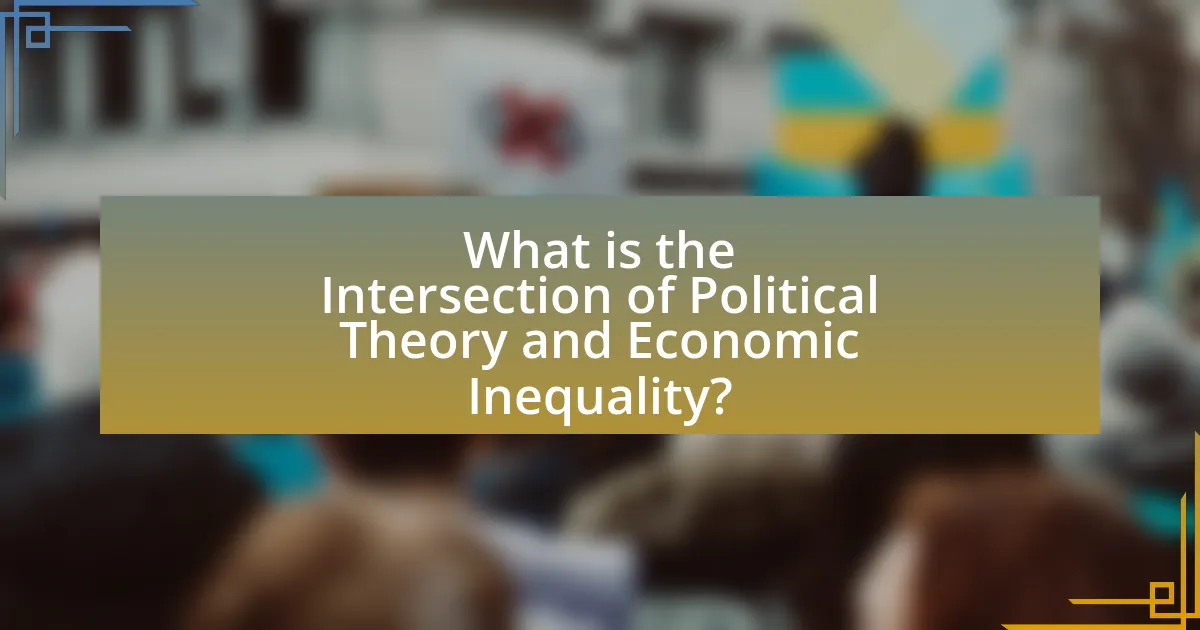
What is the Intersection of Political Theory and Economic Inequality?
The intersection of political theory and economic inequality examines how political ideologies and frameworks influence the distribution of wealth and resources within a society. Political theory provides the foundational principles that shape governance, policy-making, and social justice, which directly impact economic structures. For instance, theories such as Marxism critique capitalism for perpetuating inequality, while liberalism often advocates for free markets with some regulatory measures to address disparities. Empirical studies, such as those by Thomas Piketty in “Capital in the Twenty-First Century,” demonstrate that economic inequality can undermine democratic institutions and social cohesion, reinforcing the relevance of political theory in understanding and addressing these disparities.
How do political theories explain economic inequality?
Political theories explain economic inequality by analyzing the relationship between power structures, resource distribution, and social justice. For instance, Marxist theory posits that economic inequality arises from the capitalist mode of production, where the bourgeoisie exploit the proletariat, leading to class struggles and wealth concentration. In contrast, liberal theories emphasize individual rights and market mechanisms, suggesting that inequality can result from unequal opportunities rather than exploitation. Additionally, social contract theories argue that economic inequality is a consequence of the agreements made within societies, where some individuals or groups may gain disproportionate advantages. Empirical studies, such as those by Piketty in “Capital in the Twenty-First Century,” demonstrate how wealth accumulation and inheritance perpetuate inequality, supporting the claims made by these political theories.
What are the key political theories related to economic inequality?
Key political theories related to economic inequality include Marxism, Liberalism, and Social Democracy. Marxism posits that economic inequality arises from class struggle and the capitalist mode of production, advocating for a classless society through the abolition of private property. Liberalism emphasizes individual rights and market freedom, often arguing that economic inequality can be justified if it results from fair competition and enhances overall societal wealth. Social Democracy seeks to address economic inequality through state intervention and welfare policies, promoting a mixed economy that balances free market principles with social justice. These theories provide frameworks for understanding the causes and implications of economic inequality in society.
How do these theories differ in their approach to economic inequality?
Different theories approach economic inequality through distinct lenses, primarily focusing on the causes, implications, and solutions to inequality. For instance, classical economic theory often attributes inequality to market forces and individual merit, suggesting that disparities arise from differences in talent and effort. In contrast, Marxist theory views economic inequality as a product of capitalist exploitation, emphasizing the systemic structures that perpetuate class divisions and advocating for collective ownership to address these disparities. Furthermore, welfare economics highlights the role of government intervention in redistributing wealth to mitigate inequality, arguing that social safety nets can enhance overall societal welfare. Each theory thus presents a unique framework for understanding and addressing economic inequality, reflecting varying beliefs about individual agency, systemic structures, and the role of the state.
Why is understanding this intersection important?
Understanding the intersection of political theory and economic inequality is crucial because it reveals how political structures influence economic disparities and vice versa. This relationship shapes policies that affect wealth distribution, social justice, and individual opportunities. For instance, political theories that advocate for egalitarianism often lead to policies aimed at reducing economic inequality, as seen in Scandinavian countries where progressive taxation and social welfare systems have been implemented to promote equity. Conversely, political ideologies that prioritize free-market principles can exacerbate economic inequality, as evidenced by the widening wealth gap in the United States over recent decades. Thus, comprehending this intersection is essential for developing effective strategies to address economic disparities and promote social equity.
What implications does economic inequality have on political stability?
Economic inequality significantly undermines political stability by fostering social unrest and eroding trust in institutions. When wealth is concentrated in the hands of a few, it often leads to feelings of disenfranchisement among the majority, which can manifest in protests, riots, or even civil conflict. Historical evidence supports this; for instance, the Arab Spring was partly fueled by widespread economic disparities and lack of opportunity, leading to political upheaval across several nations. Additionally, research from the International Monetary Fund indicates that higher levels of income inequality correlate with lower levels of political participation and trust in government, further destabilizing political systems.
How does political theory influence policy decisions regarding economic inequality?
Political theory significantly influences policy decisions regarding economic inequality by providing frameworks that shape the values and priorities of governance. For instance, theories such as egalitarianism advocate for policies aimed at reducing disparities in wealth and income, leading to progressive taxation and social welfare programs. Historical examples include the New Deal policies of the 1930s in the United States, which were influenced by Keynesian economic theory and aimed at addressing the economic inequalities exacerbated by the Great Depression. These policies were justified through a political lens that emphasized social justice and collective responsibility, demonstrating how political ideologies directly inform legislative action on economic inequality.
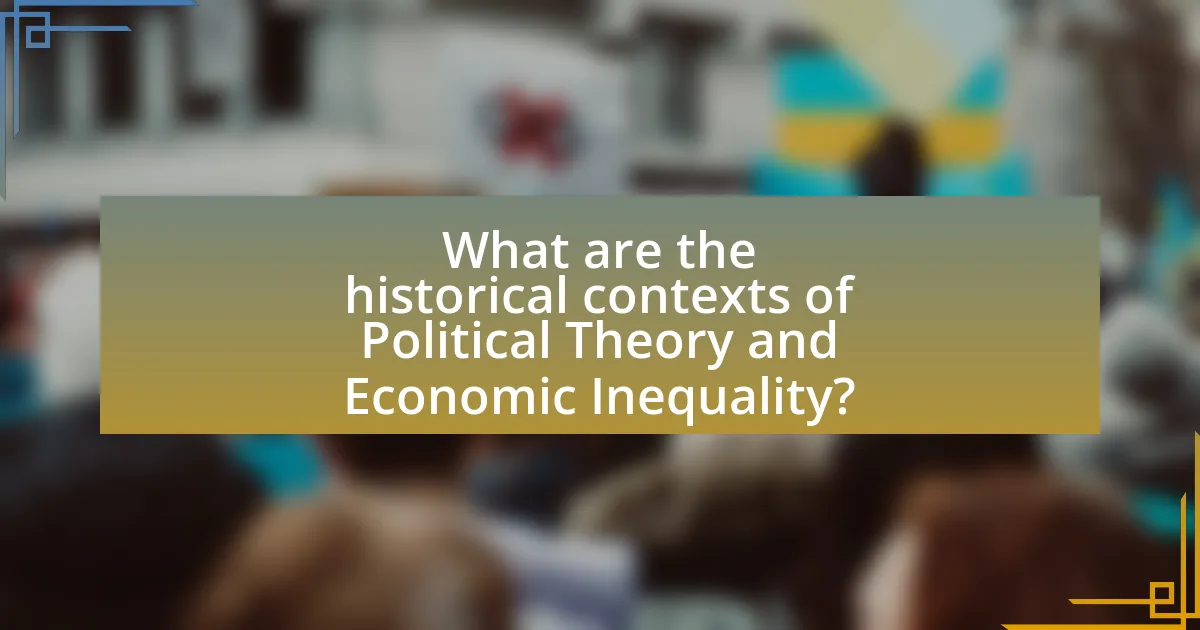
What are the historical contexts of Political Theory and Economic Inequality?
The historical contexts of Political Theory and Economic Inequality are rooted in the evolution of governance and economic systems from ancient civilizations to modern democracies. Political Theory has often grappled with the implications of wealth distribution, as seen in the works of philosophers like Plato and Aristotle, who discussed justice and the role of the state in regulating economic disparities. The rise of capitalism in the 18th and 19th centuries, particularly through the writings of Adam Smith and Karl Marx, highlighted the tensions between free markets and social equity, framing economic inequality as a central issue in political discourse. The Great Depression of the 1930s further intensified debates on economic inequality, leading to the development of welfare states and policies aimed at redistributing wealth. These historical contexts illustrate how Political Theory has continuously interacted with economic inequality, shaping policies and ideologies that address the balance between individual rights and collective welfare.
How has economic inequality evolved over time in political discourse?
Economic inequality has evolved significantly in political discourse, transitioning from a largely ignored issue to a central topic in contemporary debates. In the early 20th century, discussions around economic inequality were minimal, often overshadowed by broader concerns such as industrialization and labor rights. However, the Great Depression of the 1930s catalyzed a shift, prompting policymakers to address wealth disparities through New Deal programs aimed at economic recovery and social welfare.
By the late 20th century, particularly during the 1980s, economic inequality re-emerged as a critical issue, influenced by neoliberal policies that favored deregulation and tax cuts for the wealthy. This period saw a growing awareness of income disparity, leading to increased advocacy for social justice and economic reforms. The 2008 financial crisis further intensified this focus, highlighting systemic inequalities and sparking movements like Occupy Wall Street, which brought issues of wealth concentration and corporate influence into mainstream political discourse.
In recent years, economic inequality has become a defining issue for political candidates and parties, with discussions surrounding universal basic income, wealth taxes, and corporate accountability gaining traction. The rise of progressive movements has shifted the narrative, emphasizing the need for structural changes to address the root causes of inequality. This evolution reflects a broader recognition of economic inequality as not just an economic issue, but a fundamental challenge to democratic values and social cohesion.
What historical events have shaped the relationship between political theory and economic inequality?
The relationship between political theory and economic inequality has been significantly shaped by events such as the Industrial Revolution, the Great Depression, and the rise of welfare states. The Industrial Revolution (late 18th to early 19th century) transformed economies from agrarian to industrial, leading to stark economic disparities and prompting political theorists like Karl Marx to analyze class struggle and economic exploitation. The Great Depression (1929) further highlighted economic inequality, leading to the development of Keynesian economics, which advocated for government intervention to address economic disparities. The establishment of welfare states in the mid-20th century, particularly in Europe, was a direct response to economic inequality, as political theorists and policymakers sought to create systems that would redistribute wealth and provide social safety nets. These historical events illustrate how political theory has evolved in response to economic inequality, influencing policies and ideologies aimed at addressing these disparities.
How have different political regimes addressed economic inequality historically?
Different political regimes have historically addressed economic inequality through various policies and ideologies. For instance, socialist regimes, such as those in the Soviet Union and Cuba, implemented state ownership of resources and wealth redistribution through progressive taxation and social welfare programs, aiming to minimize class disparities. In contrast, capitalist democracies, like the United States, have often relied on market mechanisms and limited government intervention, leading to significant income inequality, although they have also introduced social safety nets and progressive taxation to mitigate disparities. Additionally, authoritarian regimes, such as those in China, have combined state control with market reforms, resulting in rapid economic growth but also increasing inequality, as seen in the wealth gap between urban and rural populations. Historical data shows that these approaches have led to varying degrees of economic inequality, with socialist policies generally achieving lower inequality levels compared to capitalist systems, where inequality has often been exacerbated by deregulation and tax cuts for the wealthy.
What role do key thinkers play in this intersection?
Key thinkers play a crucial role in the intersection of political theory and economic inequality by providing frameworks and critiques that shape our understanding of power dynamics and resource distribution. For instance, Karl Marx’s analysis of capitalism highlights the inherent class struggles and economic disparities, influencing contemporary discussions on wealth inequality. Similarly, John Rawls’ theory of justice emphasizes fairness and the redistribution of resources to achieve social equity, which has informed policies aimed at reducing economic inequality. These thinkers contribute foundational ideas that guide both academic discourse and practical approaches to addressing economic disparities in society.
Who are the prominent political theorists that have addressed economic inequality?
Prominent political theorists who have addressed economic inequality include John Rawls, Karl Marx, and Amartya Sen. John Rawls, in his work “A Theory of Justice,” argues for the principles of justice that prioritize the least advantaged members of society, emphasizing fairness in economic distribution. Karl Marx critiques capitalism and its inherent inequalities, advocating for a classless society where resources are shared equitably. Amartya Sen, through his capability approach, highlights the importance of individual capabilities and freedoms in assessing economic inequality, arguing that true development must consider the well-being of all individuals. These theorists provide foundational perspectives on the moral and ethical implications of economic inequality.
What are their main arguments regarding economic inequality?
The main arguments regarding economic inequality focus on the systemic factors that perpetuate wealth disparities and the moral implications of such inequalities. Proponents argue that economic inequality arises from structural issues such as unequal access to education, healthcare, and employment opportunities, which disproportionately affect marginalized communities. Additionally, they highlight that economic inequality undermines democratic processes, as wealth concentration allows a small elite to exert disproportionate influence over political decisions, thereby perpetuating the cycle of inequality. Empirical studies, such as those by Thomas Piketty in “Capital in the Twenty-First Century,” demonstrate that wealth concentration has increased significantly over the past few decades, reinforcing these arguments.
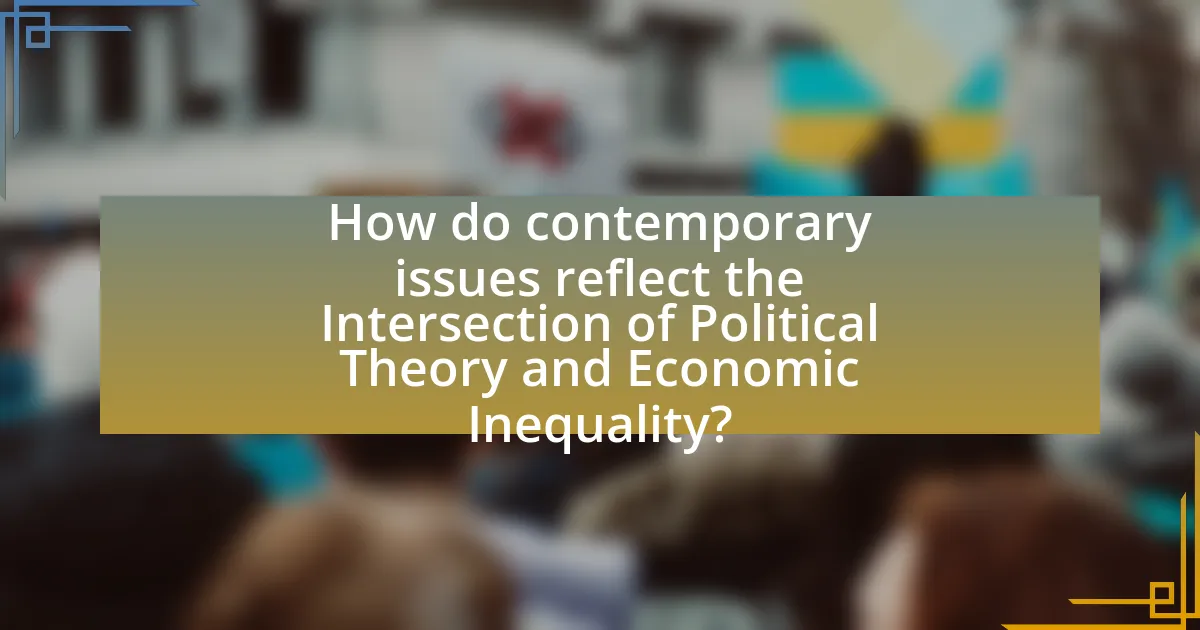
How do contemporary issues reflect the Intersection of Political Theory and Economic Inequality?
Contemporary issues reflect the intersection of political theory and economic inequality through the lens of policy debates, social movements, and economic reforms. For instance, the rise of populist movements globally highlights how economic disparities influence political ideologies, as seen in the support for leaders who promise wealth redistribution and social justice. The 2020 U.S. presidential election showcased this dynamic, where candidates like Bernie Sanders advocated for policies such as Medicare for All and the Green New Deal, directly addressing economic inequality. Research by the Pew Research Center indicates that economic inequality has become a primary concern for voters, influencing their political affiliations and choices. This correlation illustrates how political theory evolves in response to economic realities, shaping governance and societal structures.
What current events highlight the relationship between political theory and economic inequality?
Current events such as the ongoing debates around wealth tax proposals in various countries highlight the relationship between political theory and economic inequality. These discussions often center on the philosophical underpinnings of taxation, social justice, and the role of government in redistributing wealth. For instance, in the United States, proposals by politicians like Elizabeth Warren and Bernie Sanders advocate for higher taxes on the wealthy to address income disparity, reflecting a political theory that prioritizes equity and social welfare. Additionally, the implementation of policies like the European Union’s Green Deal, which aims to fund climate initiatives through progressive taxation, illustrates how economic inequality is addressed through political frameworks that seek to balance environmental sustainability with social equity. These examples demonstrate how political ideologies shape economic policies aimed at reducing inequality.
How do recent policies reflect political theories on economic inequality?
Recent policies addressing economic inequality often reflect the principles of social justice and egalitarianism found in political theories. For instance, the implementation of progressive taxation and increased social welfare programs aligns with John Rawls’ theory of justice, which advocates for redistributing resources to benefit the least advantaged members of society. Evidence of this can be seen in the American Rescue Plan Act of 2021, which provided direct payments to low-income individuals and expanded unemployment benefits, demonstrating a commitment to reducing economic disparities. Additionally, policies promoting universal healthcare, such as those proposed in various countries, echo the ideals of social democracy, emphasizing the role of the state in ensuring equitable access to essential services. These examples illustrate how contemporary policy initiatives are informed by established political theories aimed at mitigating economic inequality.
What movements are emerging in response to economic inequality today?
Emerging movements in response to economic inequality today include the Fight for $15, which advocates for a $15 minimum wage, and the wealth tax movement, which seeks to impose higher taxes on the ultra-wealthy. The Fight for $15 has gained traction since its inception in 2012, with numerous cities and states adopting higher minimum wages, reflecting a growing recognition of the need for fair compensation. The wealth tax movement, gaining momentum in the U.S. and Europe, is supported by prominent figures like Senator Elizabeth Warren, who argues that taxing the wealthiest individuals can help address systemic inequality. These movements are indicative of a broader societal push for economic justice and equitable resource distribution.
What are the potential solutions proposed by political theorists?
Political theorists propose several potential solutions to address economic inequality, including wealth redistribution, universal basic income, and progressive taxation. Wealth redistribution aims to reduce the gap between the rich and the poor by reallocating resources through social programs and policies. Universal basic income provides all citizens with a regular, unconditional sum of money to ensure a minimum standard of living, thereby reducing poverty and economic disparity. Progressive taxation involves taxing higher income brackets at increased rates, which can generate revenue for social services and reduce inequality. These solutions are supported by various studies and historical examples that demonstrate their effectiveness in mitigating economic disparities.
How do different political theories propose to address economic inequality?
Different political theories propose various methods to address economic inequality, reflecting their foundational principles. Liberalism advocates for market-based solutions and social safety nets, emphasizing individual rights and opportunities for all, as seen in policies like progressive taxation and welfare programs. Socialism, on the other hand, seeks to redistribute wealth through collective ownership and state intervention, aiming to eliminate class distinctions and ensure equitable resource distribution, as evidenced by historical examples like the Nordic model. Marxism critiques capitalism itself, proposing a revolutionary approach to dismantle capitalist structures and establish a classless society, which would inherently address economic disparities. Each theory presents distinct mechanisms and ideologies for tackling economic inequality, shaped by their views on individualism, collective welfare, and the role of the state.
What are the challenges in implementing these solutions?
The challenges in implementing solutions to address economic inequality within the framework of political theory include political resistance, resource allocation, and the complexity of policy design. Political resistance arises from differing ideologies and interests among stakeholders, which can hinder consensus on necessary reforms. Resource allocation challenges stem from limited budgets and competing priorities, making it difficult to fund initiatives aimed at reducing inequality. Additionally, the complexity of policy design requires careful consideration of various socioeconomic factors, which can complicate the implementation process and lead to unintended consequences. These challenges are supported by studies indicating that political polarization often obstructs effective policy-making, as seen in various democratic nations where proposed reforms face significant opposition.
What practical steps can individuals take to engage with this intersection?
Individuals can engage with the intersection of political theory and economic inequality by participating in local governance and advocacy efforts. By attending town hall meetings, individuals can voice their concerns about economic disparities and influence policy decisions. Additionally, joining or supporting organizations focused on economic justice, such as the Economic Policy Institute, allows individuals to contribute to research and advocacy that addresses inequality. Engaging in community discussions and educational forums on political theory can also enhance understanding and promote informed dialogue about economic issues. These actions are supported by studies indicating that civic engagement leads to more equitable policy outcomes, as seen in research by the National Civic League, which highlights the importance of community involvement in shaping effective governance.
